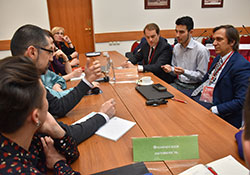Promoting healthy behaviours and ensuring a tobacco-free environment in the context of the 2018 FIFA World Cup in the Russian Federation

On 27 April 2017 WHO experts and invited speakers participated in a conference hosted by the Fédération Internationale de Football Association (FIFA) and the local organizing committee “Russia 2018” on promoting a healthy lifestyle and sport and ensuring a tobacco-free environment during the preparation and staging of the 2017 FIFA Confederations Cup and 2018 FIFA World Cup in the Russian Federation. The conference took place in Kazan, Russian Federation, one of 11 host cities of the 2018 World Cup. FIFA events have been smoke-free since 2002 and the 2018 World Cup will also follow this principle. Representatives of host city administrations responsible for ensuring healthy and smoke-free environments during the upcoming international football competition and representatives of federal and regional ministries of health and sport also participated in the conference.
Olympic Games, World Cups and other global sporting events provide a unique opportunity to leave a long-lasting and sustainable public health legacy to the host community, country and beyond. The World Cup showcases the world’s best football players and attracts millions to its matches and fan fests; billions of people watch the matches on television all around the world. This creates an ideal platform to stimulate action to promote healthy behaviours in the local population before, during and after the event.
The speakers at the conference included WHO and leading international and Russian experts working in the areas of physical activity and tobacco control. Conference participants learned more about the burden of noncommunicable diseases (NCDs) – cancer, cardiovascular diseases, chronic respiratory diseases and diabetes in the WHO European Region. They were introduced to the main groups of risk factors of NCDs – tobacco use, harmful alcohol consumption, unhealthy diets and physical inactivity. They examined the options for public health information, communications and health promotion interventions and the methods that can be adopted during large-scale sporting events to enable achievement of the greatest health gains while maintaining cost–effectiveness.
Host city representatives shared successful practices that they had implemented at local and city levels to promote healthy lifestyles and smoke-free environments. One of the activities to “walk the talk” during the conference was a group physical exercise that re-energized participants. At the end of the conference participants had an opportunity to exchange ideas in small working groups. They discussed multisectoral interventions to develop and implement a road map for the year ahead. The conference not only facilitated sharing of positive experiences but also strengthened the network of host city representatives responsible for ensuring healthy environments during the Confederations Cup and the 2018 World Cup.
A legacy for improved health
Sporting events provide a platform to implement health promotion interventions through access and engagement with communities, reinforcing positive social norms, securing the support of positive role models, generating investments and stimulating partnerships to improve health outcomes. Tobacco-free environments and promotion of physical activity interventions have been among the successful practices implemented by organizers of previous large-scale sporting events and their partners. For example, the Sochi 2014 Winter Olympic and Paralympic Games were tobacco-free: organizers implemented tobacco-free venues, provided health information and restricted tobacco sales and advertising, while engaging a wide range of partners in health promotion efforts to support the local population and visitors in adopting smoke-free behaviours. The London 2012 Summer Olympic and Paralympic Games implemented programmes both prior to and during the event to increase participation in physical activity in the local community through, for example, provision of and access to sports facilities, community-based opportunities for participation in physical activity and awareness-raising and training for health professionals on the benefits of physical activity.



